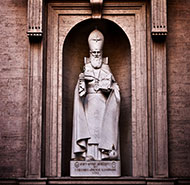
(1) The Creed (I believe in God) is the formula of the principles of the Christian religion or the first article of faith in which the principles of Christianity are formulated.
(2) According to tradition, it is the Apostles who first formulated the Creed. This is the reason why we gave it the name of Apostles’ Creed. However, the creed, that is currently recited in Church as well as in all ancient Christian churches, is the version of the Nicene-Constantinopolitan Creed, from the first Ecumenical Council in 325.
(3) The Creed is of paramount importance because generally the New Testament and particularly the Gospel contain a large number of facts and phrases, for example, regarding God, the birth and priestly activities of Christ, the Holy Spirit, eternal life and other topics, that an official and trustworthy interpretation is necessary for a true and legitimate understanding in order to avoid disagreements on this or that subject.
(4) The Creed has an intrinsic value. The Apostles and older Fathers of the Church, who saw the birth and the spread of Christianity were likely aware of ideas and the situation prevailing at that time concerning the fundamental points of the Creed. Therefore, an accurate and trustworthy interpretation, with an official formula, would serve to dispel confusion and dissension.
The Creed is the Foundation of the union of the Christian churches because each of these churches claims it and professes it.
(5) For members of each of these churches, the Creed is also the basis of the agreement and harmony concerning the faith.
(6) Therefore, knowing and accepting the Creed is an indispensable condition for the members of the Church. But, unfortunately, some do not lend him enough importance, and while remaining faithful to the Apostolic Church, they are moving away from its true understanding.
(7) the Creed includes 10 points:
For our salvation, the Son of God came down from heaven; he became incarnate by the Holy Spirit and the virgin Mary, and was made human, quite like us (but free from all sin). He was crucified, he suffered, died and was buried. He rose again on the third day, He ascended to heaven in human form and is seated at the right hand of the Father. He will come again in human form to judge the living and the dead. He will reign and His kingdom will never end.
(8) During mass, immediately after reading the daily biblical text and the extract of the Gospel, all present recite the Creed in a decent way, hands joined and out loud.
*Reference: "Catechesis" by Papken Gulesserian, Catholicos of the Great House of Cilicia, 4th edition, 1971, Antelias